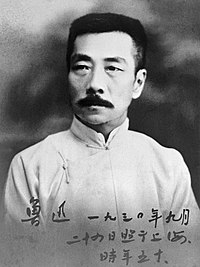Lu Xun
Zhou Shuren | |
|---|---|
 | |
| Nama pena | Lu Xun |
| Pekerjaan | Penulis cereka, pengkritik, penulis esei |
| Tempoh | 1918-1936 |
Lu Xun (Cina Tradisional:
Lu Xun's works exerted a very substantial influence after the May Fourth Movement to such a point that he was lionized by the Communist regime after 1949. Mao Zedong himself was a lifelong admirer of Lu Xun's works. Though sympathetic to the ideals of the Left, Lu Xun never actually joined the Chinese Communist Party. Lu Xun's works are known to English readers through numerous translations, especially Selected Stories of Lu Hsun translated by Yang Hsien-yi and Gladys Yang. Error: tiada nama laman disertakan (help).
Pekerjaan[sunting | sunting sumber]
Syarahan[sunting | sunting sumber]
"What Happens After Nora Leaves Home?" A Talk given at the Beijing Women's Normal College, December 26, 1923 Ding Ling and Lu Hsun, The Power of Weakness.' The Feminist Press (2007) 84-93
Cerita[sunting | sunting sumber]
- from 《呐喊》 Call to Arms (1922)
狂人 日 记 "A Madman's Diary" (1918)孔 乙 己 "Kong Yiji" (1919)- 药 " Medicine" (1919)
明天 "Tomorrow" (1920)一 件 小事 " An Incident" (1920)- 头发
的 故事 "The Story of Hair" (1920) - 风筝 "Kite" (1925)
- 风波 " Storm in a Teacup" (1920)
故 乡 " Hometown" (1921)阿 Q正 传 "The True Story of Ah Q" (1921)端午 节 "The Double Fifth Festival" (1922)白光 "The White Light" (1922)兔 和 猫 "The Rabbits and the Cat" (1922)- 鸭的
喜 剧 "The Comedy of the Ducks" (1922) 社 戏 " Village Opera" (1922)- " New Year Sacrifice" (1924)
- from《
彷徨 》"Wandering"祝福 Well Wishes(1924)在 酒楼 上 In the Drinking House (1924)幸福 的 家庭 A Happy Family (1924)肥 皂 Soap (1924)- 长明
灯 The Eternal Flame (1924) 示 众 Public Exhibition (1925)高 老 夫子 Old Mr. Gao (1925)孤独 者 Dictator (1925)- 伤逝 Sadness
弟 兄 Brothers- 离婚 Divorce (1925)
- from《
故事 新 编》"Old Tales Retold" (1935)- 补天 Mending Heaven (1935)
- 奔月 The Flight to the Moon (1926)
理 水 Curbing the Flood (1935)采 薇 Gathering Vetch (1935)- 铸剑 Forging the Swords (1926)
出 关 Going out (1935)- 怀旧 Leaving the Pass (1935)
非 攻 Opposing Aggression (1934)起死 Resurrect the Dead (1935)
Karangan[sunting | sunting sumber]
我 之 节烈观 My Views on Chastity (1918)我 们现在 怎么做父亲 What is Required to be a Father Today (1919)- Knowledge is a Crime (1919)
- 说胡须 My Moustache (1924)
看 镜有感 Thoughts Before the Mirror (1925)- On Deferring Fair Play (1925)
Koleksi[sunting | sunting sumber]
- 《呐喊》 Call to Arms (Na han) (1923)
- 《
彷徨 》 Wondering (Pang huang) (1925) - 《
中国 小 说史略 》 Brief History of Chinese Fiction (Zhongguo xiaoshuo shilüe) (1925) a substantial study of pre-modern Chinese literature - 《
故事 新 编》 Old Tales Retold (Gu shi xin bian) (1935) - 《
野草 》 Wild Grass (Ye cao) (1927) - 《
朝 花 夕 拾 》 Dawn Blossoms Plucked at Dusk (Zhao hua xi shi)(1932) a collection of essays about his youth
Rujukan[sunting | sunting sumber]
Pautan luar[sunting | sunting sumber]
| Wikipetik mempunyai koleksi petikan mengenai: Lu Xun |
| Wikimedia Commons mempunyai media berkaitan: Lu Xun. |
- Tim Gallaher's Lu Xun site, with extensive information and links to texts
- Lu Xun and other historical figures Diarkibkan 2007-02-19 di Wayback Machine
- Special Issue about Lu Xun (Jepun) at web.bureau.tohoku.ac.jp
- Lu Xun bibliography at mclc.osu.edu
- Pioneer of Modern Chinese Literature at www.coldbacon.com
- Lu Xun webpage (Cina)
- A Brief Biography of Lu Xun with Many Pictures
- Lu Xun and Japan(Jepun)
Terjemahan[sunting | sunting sumber]
- Kong Yi Ji, Lu Hsun translated by SparklingEgnlish
- Reference Archive: Lu Xun (Lu Hsun) at www.marxists.org
- Selected Stories, Lu Hsun (1918-1926) at www.coldbacon.com
- An Outsider's Chats about Written Language, a long essay by Lu Xun on the difficulties of Chinese characters
- The Lyrical Lu Xun: a Study of his Classical-style Verse -- a book by Jon Eugene von Kowallis (Honolulu: University of Hawaii Press, 1996) -- includes a complete introduction to Lu Xun's poetry in the classical style, with Chinese characters, literal and verse translations, and a biographical introduction which summarizes his life in relation to his poetry.
- Halaman menggunakan Kotak info pengarang dengan parameter yang tidak diketahui
- Laman yang menggunakan templat umur dengan tarikh tidak sah
- Templat hatnote dengan ralat
- Rencana dengan pengenalan NCL
- AC dengan 32 elemen
- Pahlawan budaya
- Kelahiran 1881
- Kematian 1936
- Penterjemah China
- Penulis bahasa China
- Penulis China
- Expatriat China di Jepun
